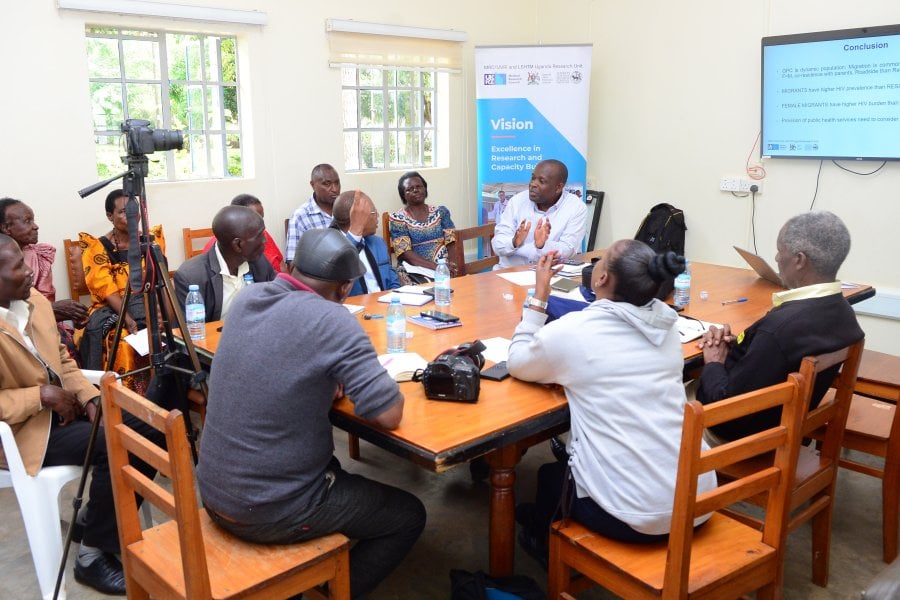Findings from studies conducted within the GPC have informed the development of government programs for HIV prevention and control, not only in Uganda but also regionally and globally.

A science café held at the GPC to commemorate World Population Day 2024 marked a significant step in increasing research awareness among the media and research communities about the importance of participation in population studies. By engaging various stakeholders, the event reinforced the value of collaborative efforts in addressing public health challenges through research.
Themed "Population Dynamics and Public Health - A Community Conversation," the event aimed to spotlight the critical significance of population dynamics on public health. Attendees included researchers, Community Advisory Boards, members of the surrounding Kyamulibwa community and media representatives.
Understanding population dynamics
A critical discussion around “Understanding Population Dynamics and their Implications for Public Health” led by Dr. Joseph Mugisha, an epidemiologist and the Head of the GPC, highlighted the importance of longitudinal population studies as a source of accurate and comprehensive data that equips decision-making individuals, bodies and agencies to effectively anticipate and manage public health challenges.
Dr. Mugisha emphasized the value of biennial survey rounds conducted at the GPC, which, guided by research questions co-developed with the research community, provide detailed data on essential demographics, including birth, death, health conditions and mobility, among others. He further emphasized the accuracy of these data, highlighting the community-led approach to updating information from the research hubs, with leadership from the community advisory board.
Monitoring population changes and disease patterns
Dr. Ivan Kassamba, a Statistical Epidemiologist at the GPC, facilitated a community discussion around longitudinal data on “Population Changes and Disease Patterns in the GPC”. The interactive session highlighted the evolution of disease prevalence in Kyamulibwa district from infectious to non-communicable diseases (NCDs), noting the significant role of population movements in influencing behavioral patterns overtime.
The scientists highlighted concerning insights into NCD prevalence at the GPC, noting that trends overtime have shown a link between chronic ailments such as diabetes and hypertension and deaths among older age groups. More youthful groups have not been spared, as stated by Bernard Mpairwe, a research scientist on the Lean + Diabetes study at the GPC. He said,
“Our data shows that the prevalence of diabetes is significantly higher than our initial estimates, with 6 out of every 100 individuals being diabetic - three times the previously anticipated rate. We also discovered that younger and lean people also get diabetes, a drift from our initial knowledge of diabetes manifesting only in older and oversized people.”
An immersive tour of the GPC’s community-based research hubs enriched participants’ understanding of the need for strong partnerships between researchers and the community to ensure research continuity. Ms. Beatrice Kimono, a study coordination and community liaison officer at the GPC informed participants that the effective activation of highly accurate demographic surveillance systems remains a challenge in contexts where researchers have limited understanding, buy-in and interest from their study communities.
She highlighted the deliberate involvement of a holistic community advisory board as a key agent in linking researchers to communities over the years. Ms. Kimono stated that the community-based hub system is a relevant mechanism that has further embedded research in the research community and boosted understanding of evolving needs and challenges.
“Initially we conducted door to door surveys, but they were expensive and time consuming. Overtime, we have adopted a new format where we identify the center of the village where a survey round is to be conducted. We pitch tent in a local home for the duration of the survey round and interact daily with the community. This has not only saved resources and enabled us to create stronger research relationships with the community, but also improved the accuracy of our data.”
With on-going innovative studies into the prevention, control and management of emerging infectious diseases and NCDs at the GPC, the platform continues to provide a formidable resource in global efforts to reinforce health standards and practices.
Related links:
Symposium to enhance scientific output and policy relevance of research from the Unit’s General Population Cohort (GPC)
Over 300 people diagnosed with diabetes in Kalungu
Read more about the GPC
LSHTM's short courses provide opportunities to study specialised topics across a broad range of public and global health fields. From AMR to vaccines, travel medicine to clinical trials, and modelling to malaria, refresh your skills and join one of our short courses today.
